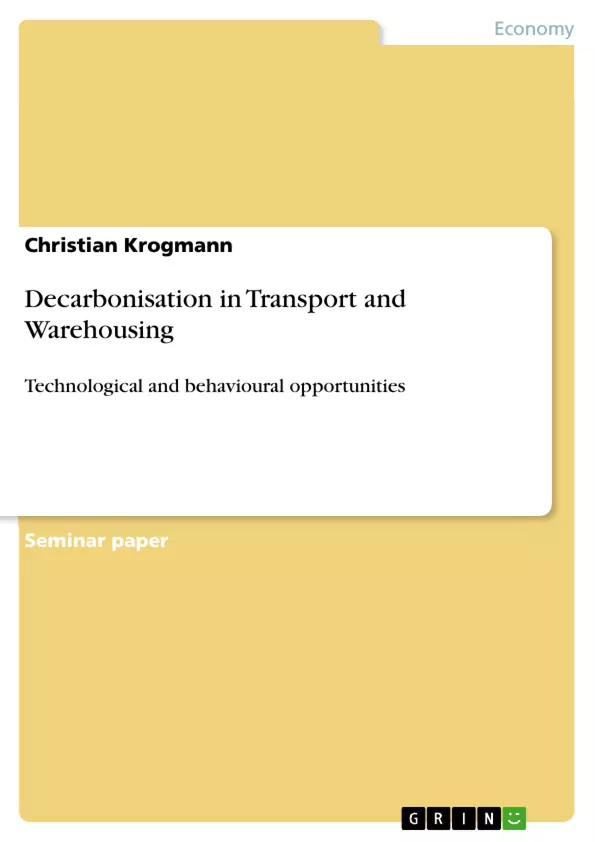The debate of climate change is occupying many parties not only in environmental terms and it has gained importance in the last decade. Although the existence of climate change and particularly a corresponding human responsibility has advocates and opponents, it is obvious that climate change will be a serious issue for everyone if it impacts our nature as predicted (IPCC, 2007a). Hence, institutions such as the IPPC, UNEP, WMO or UNFCCC were introduced in order to guide governments and principally everyone in order to assess and to mitigate climate change. The UNFCCC’s ultimate aim, for instance, is to stabilize the concentration of greenhouse gases ‘at a level that would prevent dangerous anthropogenic interference with the climate system’ (United Nations, 1992: 9). However, this ultimate aim relies on many-sided sub-ordinate targets. One of these targets is to reduce carbon emissions in the logistics sector (McKinnon et al., 2010).
In the following chapter 2, opportunities for technological and behavioural changes in order to cut carbon emissions are presented for the logistical activities freight transport (main focus is on road transport) and warehousing. In chapter 3, an evaluation of the question which set of changes is likely to have greater influence is given together with a final conclusion.
Inhaltsverzeichnis (Table of Contents)
- INTRODUCTION
- DECARBONISATION STRATEGIES IN LOGISTICS
- Freight Transport
- Technological Opportunities
- Behavioural Opportunities
- Warehousing
- Technological Opportunities
- Behavioural Opportunities
- Freight Transport
- DISCUSSION AND CONCLUSION
Zielsetzung und Themenschwerpunkte (Objectives and Key Themes)
This paper aims to explore decarbonisation strategies in the logistics sector, specifically focusing on freight transport and warehousing. The paper examines technological and behavioural opportunities for reducing carbon emissions in these two key areas of logistics operations.
- Climate change as a driver for decarbonisation in logistics
- Technological and behavioural opportunities for reducing carbon emissions in freight transport and warehousing
- Trade-offs between environmental, social, and economic considerations in decarbonisation efforts
- The importance of a holistic approach to decarbonisation, considering the entire supply chain
- The role of stakeholders, including companies, governments, and consumers, in promoting decarbonisation
Zusammenfassung der Kapitel (Chapter Summaries)
Chapter 1 introduces the context of climate change and its impact on the logistics sector, highlighting the need for carbon emissions reduction. It outlines the paper's scope and focuses on opportunities for decarbonisation in freight transport and warehousing.
Chapter 2 delves into decarbonisation strategies within the logistics sector, analyzing both technological and behavioural changes. The chapter focuses on the key aspects of freight transport, examining the potential for technological improvements in transportation modes and infrastructure as well as behavioural shifts towards more efficient transport practices. It also explores opportunities for reducing carbon emissions in warehousing through technological innovations in warehouse operations and behavioural changes in warehouse management.
Schlüsselwörter (Keywords)
Decarbonisation, logistics, freight transport, warehousing, technological opportunities, behavioural opportunities, carbon emissions, climate change, sustainability, supply chain.
Frequently Asked Questions
What is the focus of this paper on decarbonisation?
The paper explores strategies to reduce carbon emissions in the logistics sector, specifically focusing on road freight transport and warehousing.
What are "technological opportunities" for reducing emissions?
These include improvements in vehicle technology, infrastructure, and innovative equipment in warehouses to enhance energy efficiency.
What is meant by "behavioural opportunities"?
Behavioural opportunities refer to changes in management practices, driver habits, and operational shifts toward more sustainable logistics processes.
Why is the logistics sector targeted for decarbonisation?
Logistics is a major contributor to greenhouse gas emissions; international frameworks like the UNFCCC aim to stabilize these gases to mitigate climate change.
Does the paper consider the entire supply chain?
Yes, it emphasizes the importance of a holistic approach, involving stakeholders like governments, companies, and consumers across the supply chain.
- Arbeit zitieren
- Christian Krogmann (Autor:in), 2012, Decarbonisation in Transport and Warehousing, München, GRIN Verlag, https://www.grin.com/document/195085



